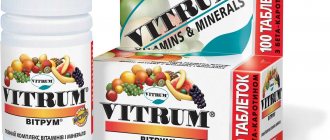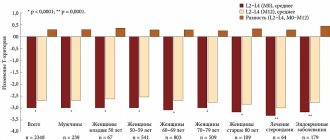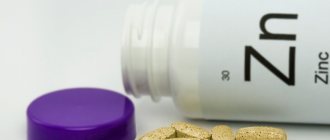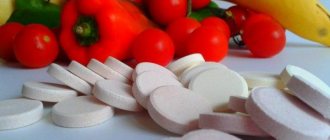Initial appointment with a THERAPIST with 25 years of experience
ONLY 1800 rubles!
(more about prices below)
Vitamin F is a vitamin-like group of three polyunsaturated fatty acids: arachidonic, linoleic and linolenic. It was opened in 1928. Its name comes from the English word “fat”, which means “fat”. Vitamin F cannot be synthesized in the human body, so it is important to obtain it daily from external sources. According to statistics, a deficiency in the consumption of this vitamin is observed in about 80% of the adult population of St. Petersburg.
If you have such an opportunity, it is best to take vitamins by injection for medicinal purposes, since their bioavailability or absorption by the body is higher when administered by injection.
Vitamin F deficiency
The recommended daily dose of vitamin F is about 1-2 g. With a lack of vitamin F, the following occurs:
- fatigue;
- dry skin, eczema;
- frequent colds;
- menstrual irregularities;
- male infertility;
- swelling on the face;
- brittle nails;
- decreased concentration.
If you feel a lack of vitamin F, I recommend including the following dishes in your menu:
- salad of fresh vegetables and mussels;
- fried eggs with avocado;
- scallop stewed in cream.
| Service | Price | Promotion Price |
| Beauty-cocktail (11 blood tests, 10 Beauty-drips, appointment with a therapist) | 39,000 rub. | RUB 35,555 |
| Immuno Protect program (2 blood tests, Immuno Protect droppers, appointment with a therapist) | RUR 7,777 5 sessions | RUB 11,111 10 sessions |
| Anti-age program (blood test for vitamin B 1, B5, B6, B12, C, E, K, D, IVs with an individual vitamin complex, appointment with a therapist) | RUB 21,111 5 sessions | RUB 25,555 10 sessions |
| Anti-stress program (7 blood and urine tests, 10 Anti-stress droppers, appointment with a therapist) | 35,000 rub. | RUB 29,999 |
| Detox program for comprehensive body cleansing (10 droppers, 10 autohemotherapy, tests, appointment with a therapist) | 17,000 rub. | 13,500 rub. |
| Recovery course of IVs after COVID-19 (Coronavirus) | 4050 rub. 5 sessions | 8100 rub. 10 sessions |
| Vitamin therapy (course of 10 intramuscular injections, consultation with a therapist) | 4,000 rub. | 3,000 rub. |
| Intravenous drip administration of drugs (without drugs, 1 bottle) | 800 rub. 1 session | RUB 3,375 5 sessions 6,750 rub. 10 sessions |
| Intravenous drip administration of medications (with existing clinic medications, 1 bottle) | 950 rub. 1 session | 4,050 rub. 5 sessions 8,100 rub. 10 sessions |
| Intravenous drip administration of drugs (without drugs, 2 bottles) | 950 rub. 1 session | 4,050 rub. 5 sessions 8,100 rub. 10 sessions |
| Intravenous drip administration of medications (with existing clinic medications, 2 bottles) | 1100 rub. 1 session | 4,700 rub. 5 sessions 9,400 rub. 10 sessions |
| Intravenous administration of drugs (course) | 450 rub. 1 session | RUB 2,140 5 sessions 4,050 rub. 10 sessions |
| Intravenous administration of immunoglobulin (without the cost of the drug) | 3500 rub. | |
| Dropper of Human Immunoglobulin - Imbioglobulin 50 mg/ml, 20 ml (price includes the cost of the drug) | 7500 rub. | |
| Dropper of Human Immunoglobulin - Imbioglobulin 50 mg/ml, 50 ml (price includes the cost of the drug) | 10500 rub. | |
| Dropper of Human Immunoglobulin - Octagam 50 mg/ 50 ml (price includes the cost of the drug) | 14,000 rub. | |
| Dropper of Human Immunoglobulin - Octagam 50 mg/100 ml (price includes the cost of the drug) | 29,000 rub. | |
| Dropper of Human Immunoglobulin - Octagam 50 mg/200 ml (price includes the cost of the drug) | 49,000 rub. | |
| Dropper of Human Immunoglobulin - Intratect 50 mg/ 50 ml (price includes the cost of the drug) | 14,000 rub. | |
| Dropper of Human Immunoglobulin - Intratect 50 mg/100 ml (price includes the cost of the drug) | 29,000 rub. | |
| Dropper of Human Immunoglobulin - Intratect 50 mg/200 ml (price includes the cost of the drug) | 49,000 rub. | |
| Appointment (examination, consultation) with a general practitioner to prescribe IVs | 1,800 rub. primary | 1,500 rub. repeated |
| Autohemotherapy | 550 rub. 1 session | 2,500 rub. 5 sessions 5,000 rub. 10 sessions |
| Plasma therapy of the spine and joints | 4500 rub. 1 session | 10,500 rub. 3 sessions 17,500 rub. 10 sessions |
| Subcutaneous-intradermal administration of drugs (course) | 250 rub. 1 session | RUB 1,180 5 sessions 2,250 rub. 10 sessions |
| Intramuscular administration of drugs (course) | 300 rub. 1 session | RUB 1,575 5 sessions 2,700 rub. 10 sessions |
Author: Telegina Natalya Dmitrievna
Therapist with 25 years of experience
>
What is vitamin F and why is it beneficial?
Many people know about vitamins A, C, D, B vitamins and some others, but vitamin F is less known, although it plays an important role in the normal development and functioning of a number of body systems.
Vitamin F was discovered in 1928. It is a complex of polyunsaturated fatty acids, and its very name comes from the English word “fat,” which means “fat.” Vitamin F is not synthesized in the body; a person can only receive it from the outside, with food and multivitamin complexes, NOI.md reports with reference to wday.ru.
These seeds can replace meat
What are the beneficial properties of vitamin F?
The polyunsaturated fatty acids that make up this vitamin complex (linoleic, linolenic and arachidonic) have an anti-inflammatory effect, help well in the prevention and treatment of atherosclerosis, and effectively cure some skin diseases. They strengthen the hair roots, protect the skin from solar ultraviolet radiation, and promote the healing of wounds and ulcers.
Vitamin F strengthens cell membranes, retains moisture in the skin, thereby ensuring its firmness and elasticity and fighting wrinkles. Therefore, it is widely used in various moisturizing creams and medicated skin masks. In addition, vitamin F helps get rid of cellulite. Cocoa powder is very rich in this vitamin, which is part of the mass for the so-called chocolate wrap, which makes the skin smoother.
Therefore, vitamin F is often informally called the “vitamin of youth.” After all, with its help, skin and hair look very good and beautiful!
Vitamin F not only helps normalize fat metabolism, but also directly affects fat synthesis.
Vitamin F plays an extremely important role in maintaining the normal functioning of the nervous system. The fact is that it stimulates the synthesis of prostaglandins - substances that directly affect the processes of excitation and inhibition.
Through prostaglandins, vitamin F provides support to the entire nervous system, because these substances are mediators in various reactions of excitation and inhibition of muscles and nerve centers.
It promotes the production of breast milk in nursing mothers. In addition, vitamin F improves the absorption of phosphorus and calcium, which has a beneficial effect on the condition of the skeletal system.
A very important property of vitamin F is the ability to convert cholesterol into a soluble form, thereby preventing its accumulation in the body. And this prevents many cardiovascular diseases. This vitamin protects cells from harmful substances, thereby preventing the development of cancer.
For example, the indigenous people of the North include in their diet a lot of fish rich in unsaturated fatty acids, and thanks to this, despite the harsh living conditions, they rarely suffer from heart and vascular diseases
In addition, vitamin F has a beneficial effect on reproductive function. Polyunsaturated fatty acids are necessary for spermatogenesis. With their deficiency, sperm production noticeably decreases, and the germ cells themselves become of less quality.
Vitamin F will also help a person alleviate allergies, as it contains prostaglandins that prevent the release of histamine. The vitamin relieves swelling, promotes contraction of small bronchi, and improves blood flow.
This vitamin helps strengthen the immune system. Since it reduces histamine levels, it helps fight a number of diseases (including allergic reactions). Together with vitamin D, this vitamin is involved in the process of calcium deposition in bone tissue.
The listed list of benefits of vitamin F is far from complete, but one can easily conclude how useful and necessary it is for the human body. This is why it is so important to consume foods rich in this organic compound every day.
What foods contain a lot of vitamin F, and what can lead to its deficiency?
You will need:
- sea fish
- nuts
- sunflower seeds
- vegetable oil
- cocoa
- multivitamin complexes
As already mentioned, a lot of vitamin F is found in sea fish, especially fatty ones. Various nuts, sunflower seeds, and vegetable oils—olive, sunflower, and corn—are also rich in this vitamin. There is also a lot of vitamin F in cocoa fruits.
A healthy adult needs about 10 milligrams of vitamin F per day. For some liver diseases, the norm should be increased to 100 milligrams.
Consumption rate
There is no clear information about the required amount of vitamin F for the body. According to rough calculations, the norm is about 1000 mg per day. To obtain such a volume of fatty acids, you should take 25–35 g (2 tablespoons) of vegetable oil per day.
For people with high blood cholesterol, the dose of vitamin F should be 10 times higher. The same applies to people suffering from vascular atherosclerosis and excess body weight. This is due to the substance’s ability to accelerate fat metabolism.
The daily intake of vitamin F is 1000 mg.
The dosage also increases when playing sports. For speed-strength training, it is 5–6 g per day. At competitions - already 7-8 g per day. If the goal of training is to develop endurance, then during the training period the dose of vitamin F is increased to 7–9 g per day. During competitions - up to 10–12 g per day.
The daily requirement for vitamin F is high in pregnant and breastfeeding women. An additional amount of the substance is required in the treatment of autoimmune and skin diseases, diabetes, prostatitis, and during organ transplant operations.
Source
Vitamin F is found in vegetable oils, such as soybean, olive, corn, sunflower, peanut and others.
A large amount is also found in animal fat. Vitamin F is only found in foods of animal origin, so those who do not eat this food do not receive it at all, which means the normal functioning of the body becomes impossible. Thanks to unsaturated fatty acids, cholesterol levels in the blood are normalized, and this is necessary to combat atherosclerosis.
Properties
Vitamin F plays an important role in preventing the formation of blood clots, it serves as a natural remedy that can thin the blood, thereby having a beneficial effect on the functioning of the cardiovascular system.
Another important point that speaks to the need for vitamin F to be supplied to the body is that without it, the reproduction process is impossible, therefore, vitamin F is vital!
With a constant lack of vitamin F, there is a gradual destruction of body cells, and, consequently, tissues and organs. The result is a reduction in human lifespan.
Vitamin F is prescribed for lipid metabolism disorders, diabetes mellitus, and many allergic diseases. It serves as a preventive measure for the development of phlebitis.
An overdose of a vitamin can manifest itself as excessive weight gain. In addition, a large intake of vitamin F can cause bleeding due to severe blood thinning.
How does it affect the skin?
The benefits of vitamin F have been clearly proven. If you pick up a tube of skin cream, this vitamin is sure to be present in the composition, because thanks to it our skin glows with health and shines in the sun. When working together with other vitamins, a powerful antioxidant effect occurs in our body.
For any damage to the skin, it has an immediate effect on the affected area. For various skin diseases, be it eczema or dermatitis, it leads to a speedy recovery. One has only to apply the drug to the skin, saturated with this element.
When it comes to cosmetics, vitamin F always comes first. It retains moisture on the skin, making it elastic and pleasant to the touch, which prolongs the youth of your skin.
Reference! The drug can be purchased at the pharmacy in the form of tablets or ampoules.
Vitamins F
According to the classification of vitamins, the substance known as vitamin F (aka vitamin F) belongs to the fat-soluble vitamins. However, this substance is more familiar to us under a different name - Omega or polyunsaturated fatty acids. Therefore, the word vitamin can be safely used in the plural.
Vitamins of group f are essential, that is, vital, irreplaceable nutritional factors. They are not synthesized by the human body and therefore must be supplied daily with food.
Vitamin f is a group of fatty acids with a specific structure. This group includes Omega-3 and Omega-6 fatty acids. Vitamin F has the following composition:
| Omega-3 | Omega-6 |
|
|
The main ones are linoleic and linolenic acids.
In terms of their chemical properties, linoleic and other Omega acids are thermolabile: they are destroyed by prolonged heating, as well as under the influence of ultraviolet radiation. During long-term storage they become oxidized by atmospheric oxygen.
You can read more about the meaning and properties of fatty acids here.
Linoleic acid has the following formula:
As we can see, the linoleic acid molecule contains as many as 3 double bonds, making it a polyunsaturated acid.
And the formula for linolenic acid is:
It contains 4 double bonds and is also a polyunsaturated acid.
What is vitamin F for? Read on.
Demo lessons on the program “Nutriciology”
Get access








